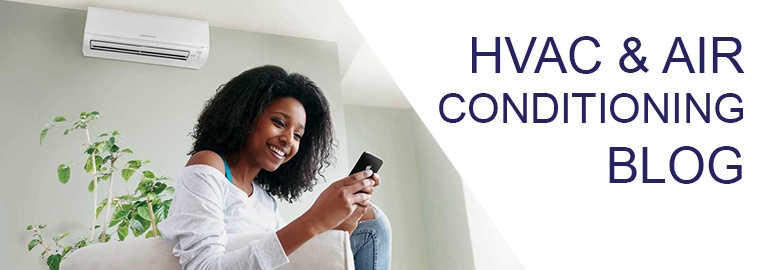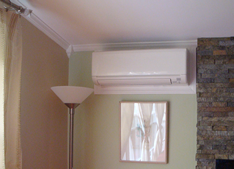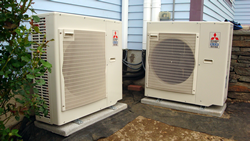
So what IS ductless air conditioning?
Ductless (also called mini-split) AC systems are an efficient and affordable alternative to traditional central heating and air conditioning. Going ductless is a flexible, high-efficiency option for those looking for simple, zoned comfort solutions systems without the need for extensive lines of duct work to circulate air. Multi-zone units also can be used to control temperature in different rooms.
Ductless systems consist of one or more outdoor compressor units and indoor air-handling units, called “heads”, linked by a dedicated refrigerant line. Ductless Mini-Splits are an excellent choice for cooling bedrooms, offices, bonus rooms, add-ons or any space in which installing duct work is not feasible.
The system is made up of the indoor unit which can be mounted on the wall or ceiling. The small indoor unit connects to the outdoor unit. Multi-zone outdoor units connect multiple indoor units, providing individualized comfort control to different areas within the home.
Homeowners have given rave reviews about how quiet Ductless Mini-Splits are when operating, which is done by convenient remote control, programmable touch-screen thermostat controls or WI-FI.
Energy efficient and environmentally-friendly, ductless mini-split systems:
- Are Easy to install & operate
- Are attractive because they’re compact in size
- They operate quietly
- The provide filtration from allergens
- They give precise and total comfort control
- They save money
Ductless air conditioning systems consume less energy than traditional central air conditioning, which can dramatically reduce your energy usage. For zoned systems, you can control individual room temperature and only use energy where and when you need it!
Installation is fast, easy and affordable. AND – your local utility may have incentives available to upgrade to a ductless system – many localities do, and you could save as much as 30%. Check for incentives in your area with Ductless Heating & Cooling Systems’ website – they provide a convenient Utility Incentive lookup tool at:http://goingductless.com/consumer/how-to-go-ductless/utility-incentives.
In addition, purchases of qualifying systems may be eligible for the Federal Energy Tax Credit (see related article – Congress Extends Energy Tax Credits on Air Conditioning & Heating). A trained and licensed HVAC contractor can help you determine if a ductless air conditioning system is a viable option for your home and recommend which product options are right for you. For more information, contact Total Comfort Mechanical Heating and Air Conditioning Service website at http://totalcomfortmech.com.
Posted on December 16, 2013
Did you know that heating and cooling your home uses more energy than any other system in your home and accounts for approximately 56% of your total utility bill or more? With recent forecasts for a spike in this winters’ fuel costs – it’s a wise decision to prepare for the colder weather ahead. Following a few small steps can help you to save big on your home heating costs.
Why Massachusetts residents should pay attention
According to energy.gov:
- Natural Gas customers will pay an average of $679 this winter for heating, up 13% from last year.
- Electricity customers will pay $909, up 2 %
- Propane customers in the Northeast US will pay $2,146; an increase of 11%
- Heating oil customers will pay $2,046, down 2%.
Here are a few strategies for reducing your heating bill this winter:
- Use a programmable thermostat. Save money by simply setting your thermostat 10 degrees lower when you’re away from home or asleep.
- Keep air vents clean and uncovered so heat can easily flow throughout your home.
- Use natural sunlight to your advantage. Open drapes when you are getting direct sunlight, then close them at night to keep heat from escaping. Think of the sun as a heater and your drapes as a blanket.
- Make sure the damper in your fireplace is closed when not in use.
- Replace the air filter at least once a month.
- Schedule a heat system check-up with a reputable heating contractor. Regularly scheduled maintenance of your heating system keeps it running most efficiently and increases the life of the equipment.
Many states, including Massachusetts, offer rebates for homeowners who invest in Energy Star products which utilize the latest technologies designed to consume less energy. These incentives being offered are above and beyond Federal Tax Credits for installing approved heating and cooling systems. For example, Massachusetts utility customers can receive up to an additional $300 mail-in rebate from Cool Smart on qualifying installations. Check with your local HVAC contractor experts at Total Comfort Mechanical for more information.
This entry was tagged Heating contractor, Energy, Heating, MA, Massachusetts, Heat and posted on October 31, 2013
How to keep your central air conditioning system running efficiently
Our customers and subscribers have asked for suggestions on how to reduce the energy costs associated with home cooling during the summer months. To help, we’ve compiled this list for easy reference, and to easily share with friends and family, too!
Looking for ways to beat the heat? July has been a scorcher in Burlington, and neighboring Massachusetts areas it looks like August will bring more of the same.
Try these tips to keep your air conditioning system running efficiently:
- Replace filters regularly! This is one of the easiest things to do yet one of the most commonly overlooked. Filters should be replaced monthly, so make it a habit by keeping a supply of filters on hand.
- Set your thermostat and leave it. Pick a temperature that you are comfortable with (perhaps 75°) and keep it at a constant setting. Turning the thermostat down doesn’t affect the temperature of the air blowing out of your vents. It makes the system run longer, not colder.
- Keep curtains, drapes and blinds closed, especially on the west-facing side of your house.
- Shade your air conditioner. Your unit works harder if it is in an area that receives full sun.
- Don’t block the AC unit. Keep air flow free from obstructions.
- Keep household appliances that produce heat far away from your thermostat. You don’t want an adjacent TV or water heater to contribute to a false thermostat temperature.
- Caulk around window frames to seal any leaks and check weather stripping.
- Invest in a few good ceiling fans or some smaller portable fans. Fans provide evaporative cooling as you sweat. If you buy a ceiling fan with lights, opt for those with Compact Fluorescent Lamps (pin-type) CFL’s, which last up to 15 times as long as incandescent bulbs.
- If your home has a fireplace, don’t send cool air up the chimney – close the damper and shut glass doors.
- Schedule regular service on your air conditioning system. Your system’s refrigerant charge needs to be checked annually, and the AC unit needs to be cleaned professionally. A/C Maintenance ensures your system is running at peak efficiency.
If you are concerned about obtaining optimal efficiency from your Air Conditioning system, be sure to schedule an A/C system maintenance check with your HVAC contractor. A professional will check multiple factors to ensure all air conditioning system components are operating properly, and that the system is meeting the manufacturer’s expectations for efficiency.
This entry was tagged AC, Burlington MA, Tips, Efficiency, Air Conditioning, Air Conditioner, Keep Cool, Energy bill and posted on August 02, 2013

Finally there’s some good news from Washington DC. Relief has been provided to homeowners that have made energy efficiency improvements in 2013 or plan to invest in such improvements this year.
While representatives haggled over the notorious “Fiscal Cliff” earlier this year, Congress voted to extend the popular Federal tax credits for Consumer Energy Efficiency. This serves as an incentive to upgrade systems in existing homes by installing energy- efficient air conditioning systems, heat pumps and hot water heaters. Other improvements such as roofing, windows and insulation may also qualify.
The tax credit amount varies depending on the type of energy-efficient heating and air conditioning component(s) installed. To be eligible, the products must be installed in a home that you own and serves as your primary residence.
Central Air Conditioning products must meet certain minimum Seasonal Energy Efficiency Rating (SEER) or Energy Efficiency Ratio (EER) to qualify. Heat Pumps are given a Heat Seasonal Performance Factor (HSPF). The higher the SEER, EER or HSPF, the more efficient the system is.
Which heating and air conditioning improvements are eligible for the Federal tax credit?
Central Air Conditioning Systems (CACs)
- Split Systems (outdoor compressor, indoor evaporator coil and air handler) 16 SEER, 13 EER or above
- Package Systems (all-in-one outdoor pack) rated 14 SEER, 12 EER or above
- Tax Credit amount: 10% of cost, maximum credit: $300.00
Geothermal Heat Pumps
- All Energy Star qualified heat pumps are eligible
- Tax Credit amount: 30% of cost, no upper limit
Air Source Heat Pumps
- Split Systems with a minimum 8.5 HSPF, 12.5 EER, or 15 SEER
- Package Systems with a minimum 8 HSPF, 12 EER, or 14 SEER
- Tax Credit amount: 10% of cost, maximum credit: $300.00
Natural Gas, Propane or Oil Furnaces and Boilers
- Must be rated AFUE (Annual Fuel Utilization Efficiency) 95% or above
- Tax Credit amount: 10% of cost, maximum credit: $150.00
Most of the tax credits allow inclusion of the cost of installation in the eligible amount, but there is a lifetime maximum credit allowance of $500.00. If you have or plan to install energy-efficient products, call Total Comfort Mechanical Heating and Air Conditioning in Burlington, MA – to consult with professional HVAC experts and find out if any other rebates are available. Be sure to also consult a tax advisor for specific details when filing your tax r
This entry was tagged Energy Rebates, AC, Ductless, Pumps, Air Conditioning, Heat Pumps, MiniSplit, Heat, Energy Tax Credit and posted on June 06, 2013
Ductless air conditioning is quickly gaining popularity in the US, as it is in Europe and Asia over recent years – for many reasons. A Ductless (mini-split) AC unit is an efficient and affordable alternative to the traditional central heating and air conditioning systems that require a network of duct lines to circulate air.
In older homes that have no ducts or a newly-built home that doesn’t use forced-air heat (with no ductwork), installing a central A/C system can be extremely costly. Opting for a ductless air conditioner or even multiple units to cool different zones in the home is a more affordable solution.
Multi-zone outdoor units connect more than two indoor units, providing individualized comfort control to different areas within the home. For example, the Mitsubishi Ductless outdoor multi-zone units can be configured for as many as four or more individual ductless air conditioning units. Mini-split systems also are excellent for sun rooms and homes with hydronic heating.
Ductless indoor units (also known as ductless mini-splits) can also be controlled with convenient remote controls – both wireless and wall-mounted programmable touch-screen thermostat controls and WI-FI.
7 benefits of Ductless Air Conditioning:
- Energy- efficient technology, Environmentally-friendly
- Easy to install & operate
- Compact in size
- Quiet Operation
- Allergen Filtration
- Precise and total Comfort Control
And number 7, they save money. Ductless air conditioning uses less energy than traditional air conditioning systems, which can dramatically reduce your energy usage. For zoned systems, you can control individual room temperature and only use energy where and when you need it!
Consult with an HVAC professional to determine if a ductless air conditioning system is a viable option for your home and to get recommendations on which product options are right for you. Diamond Contractors that specialize in ductless A/C system installation and trained experts like those at Total Comfort Mechanical in Massachusetts can give you a quick estimate and also find out if any other rebates and tax credits are available.
This entry was tagged AC, Ductless, Air Conditioning, Air Conditioner, MiniSplit, Lexington MA and posted on May 28, 2013
Archives
- December 2013 (2)
- December 2016 (2)
- May 2013 (1)
- June 2013 (1)
- August 2013 (1)
- October 2013 (1)
- February 2014 (1)
- April 2014 (1)
- July 2014 (1)
- August 2014 (1)
- December 2014 (1)
- March 2015 (1)
- April 2015 (1)
- January 2016 (1)
- February 2016 (1)
- April 2016 (1)
- June 2016 (1)
- July 2016 (1)
- January 2017 (1)
- January 2018 (1)
- January 2019 (1)
- February 2019 (1)
- January 2020 (1)
Posts by Tags
- Air Conditioning (18)
- Heating (10)
- AC (9)
- Burlington MA (8)
- MiniSplit (8)
- HVAC (7)
- Heat (6)
- Heating contractor (6)
- MA (6)
- Ductless (5)
- Ductless AC (5)
- Energy (5)
- Energy Efficiency (5)
- Heat Pumps (5)
- Massachusetts (5)
- Tips (5)
- Air Conditioner (4)
- Award (4)
- Energy bill (4)
- Angie;s List (3)
- Efficiency (3)
- Energy Rebates (3)
- Energy Star (3)
- Furnace (3)
- Mitsubishi (3)
- Mitsubishi AC (3)
- Reviews (3)
- Keep Cool (2)
- Cooling (1)
- ERV (1)
- Energy Tax Credit (1)
- Humidifiers (1)
- IAQ (1)
- Indoor Air Quality, (1)
- Lexington MA (1)
- Pumps (1)
- Recycling (1)
- Replacement (1)
- Storm (1)
- Ventilation (1)
- Winter (1)








